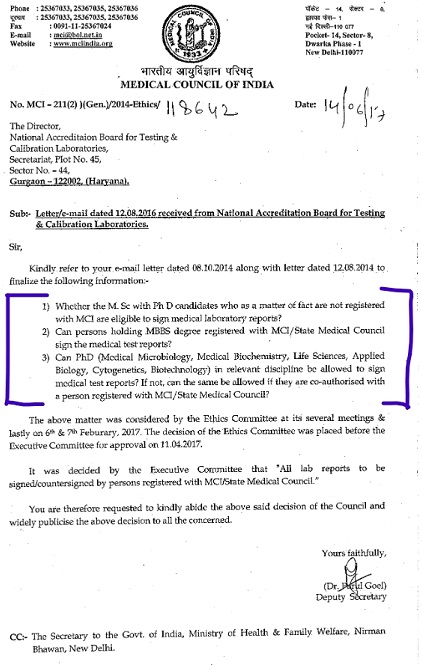DELHI HIGH COURT CLARIFIES NO LAB TECHNICIAN CAN VERIFY LAB REPORTS
Posted on APRIL, 11 2018
A division bench of the Delhi High Court has dismissed an appeal filed by Association of Clinical Biochemists and Microbiologists (ACBM) and upheld the MCI’s (Medical Council of India) notification that bars all laboratory technicians from verifying medical test reports.
To give a backdrop to the event, the National Accreditation Board for Testing and Calibration Laboratories (NABL) had raised a three-point clarification notification to the Medical Council of India on dated 12.08.2016. According to the letter NABL sought clarification to the following queries.
- Whether the M. Sc. with Ph. D. candidates who as a matter of fact are not registered with MCI are eligible to sign medical laboratory reports?
- Can persons holding MBBS degree registered with MCI/State Medical Council sign the medical test reports?
- Can PhD (Medical Microbiology, Medical Biochemistry, Life Sciences, Applied Biology, Cytogenetics, Biotechnology) in relevant discipline be allowed to sigh medical test reports? if not, can the same be allowed if are co-authorised with a person registered with MCA/State Medical Council?
Refer to the notification presented below that MCI issued o NABL in reply to its query generated on dated 12.08.2016.

The Medical Council of India has clarified in the answer to the notice stating, “All lab reports to be signed/countersigned by persons registered with MCI/State Medical Council.”
Hence, according to the letter, two immediate implications can be indicated.
- Only qualified MBBS practitioners, who are registered with the Medial Council of India or the State Medical Council can now be allowed to sign lab reports.
- Henceforth, no Medical MSc candidate or PhD candidates or Laboratory technician can sign lab reports. This is because the practitioners are not registered with MCI/State Medical Councils.
This is a welcoming step in the medical fraternity and it is expected that with this notification, there will be more efficiency introduced to the system. The concern of reports getting verified and passed by unauthorised practitioners was always there. An incomplete, insufficient or properly unverified lab report can prompt towards misleading disease information. This can further lead to wrong medical prescription or wrong surgical or clinical procedures and adversely affect the patient’s condition.
While we are strongly advocating for automating medical writing system notifications like this is a boon towards achieving greater efficiency in the entire system. Proper, verified laboratory reports will result in informed, appropriate and accurate medical prescription writing.
The inferences can be suitably included in state-of-the-art prescription writing software, wherein a registered MBBS practitioner, authorised to sign lab reports can directly forward the verified lab report to respective medical practitioners though an automated medical writing software so that critical, valuable time and resources can be saved. This will not only bring time efficiency, but will also fasten the patient turnaround time, bring in transparency and safe medical/health record keeping.





